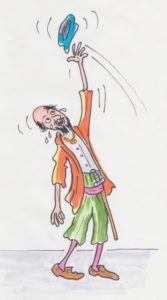07 July 2016
Hats and Henley
A language of accessories.
By Chin Chin
It was as racing ended and the band struck up “God save the Queen” that I realised my error in not wearing a hat. It isn’t that men have to wear hats at Henley. The regatta has dress regulations, to be sure, but they only require a jacket and a tie. Nor was my chagrin at my omission prompted by a sense of style. For the ladies, a hat may be the crowning glory of an elegant outfit, but not even the most modern disciple of “vintage” clothing could describe the dog-chewed, moth-infested panama which I keep in my wardrobe as an essential sartorial accompaniment. No, for me the need for a hat at the regatta has nothing to do with conformity or fashion. Rather it is driven by language.
Now contrary to what some readers may think, I do not mean that I have a talking hat in the Harry Potter sense. By language I mean the making of statements and that can often be done as eloquently with a hat as with the finest poetry.
Watch how foreigners behave when their national anthems are played. They often look as though they cannot remember the words but that doesn’t matter in the least if they put their hands across their heart, a gesture which radiates patriotism and sincerity. We British do not go in for that sort of thing so we have to content ourselves with standing to attention. Even Kenneth Branagh at his finest would find it difficult to translate that into an expression of emotion.

This is where the hat comes in. At the roll of the drums you can sweep it from your head with a panache worthy of the Three Musketeers. If, in doing so, you happen to knock the beer of the man who grabbed the seat you thought you had reserved into his lap, well, that can be his contribution to national pride. It would be churlish of him to object while the Anthem is being played. Anyway the gesture has just the right effect. You have made your patriotic statement without being the least bit un-English. Better still, you have upstaged all the gesticulating continentals.
The removal of a hat does not just speak to national pride. The gesture can say other things, too. Henley Royal Regatta is a sort of watering hole for young ladies in very pretty dresses. They fill the enclosures, a sight for sore eyes in a wet July. You would like to pay them compliments but alas you cannot; it would clearly be inappropriate to speak to those to whom you have not been introduced. Never mind, a gentle raising of the hat can say more than a thousand words and you can earn a charming and conspiratorial smile in return, without compromising your Englishness for a single moment.
Hat language doesn’t always work, of course. When the Duke of Northumberland’s attempts to install Lady Jane Grey as Queen failed in 1553, he tried to switch sides by throwing his cap into the air and calling on God to save Mary Tudor. Unfortunately God seems to have taken this a bit too literally because he did save Mary Tudor but not the Duke of Northumberland, which was presumably part of the general idea. On the other hand it may just have been the wrong sort of hat, some dreadful French concoction, perhaps, which offended the presumably excellent taste of the Almighty. Now if he’d had a battered Panama, the outcome might have been quite different.
It isn’t just hats, of course. There are other fashion accessories which can be used to convey a message just as eloquently. Umbrellas, for example. Many years ago, I took a young lady to the theatre. She was pretty by any standards and had a “butter wouldn’t melt in her mouth” look which, as any reader of a certain kind of novel would assume, was entirely deceptive. It was a good play, if a long one, and, as was the practice in those days, at the end of it the national anthem was played.
The audience duly stood; all that is apart from one young man who, either as an act of rebellion or in answer to an urgent call of business or nature, left his seat and started striding towards the exit. My fair companion frowned. She had conventional views on how one should behave in such circumstances and didn’t care for people dashing out during the Anthem. She had with her an umbrella and as the young man passed her she moved. Quick as a striking cobra she reversed her grip and hooked the handle round his leg, sending him sprawling down the aisle. By the time he had staggered back to his feet, the blood running from a split lip, the umbrella had quite disappeared and she was just another member of the audience murmuring sympathetically and asking how the he could possibly have been so careless as to slip.
Tomorrow I’m going back to Henley and, as the national anthem strikes up, I will stand by the gate through which those who go for a quick escape make their surreptitious exits. I had intended to take my hat so that I could make a point by sweepingly it off magnificently at the appropriate moment. On reflection, however, the act of taking it from my head might impede the speed of my right hand. Tomorrow promises to be a wet day and in my right hand I shall have my umbrella.
If you enjoyed this article please share it using the buttons above.
Please click here if you would like a weekly email on publication of the Shaw Sheet

